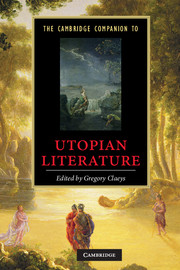6 - Utopia, dystopia and science fiction
from Part II - Literature
Published online by Cambridge University Press: 28 September 2010
Summary
“The once and often suggestive field of utopian fantasy has been exploited, perhaps under the comic-book definition, into a bastard literary device known as 'science fiction.' This product bears about the same resemblance to utopian speculation that the tales of Horatio Alger bore to the economic theories of Adam Smith. / [Literary] forms are the common property . . . of writers and audiences or readers, before any communicative composition can occur.” / Despite some dismissals of science fiction's significance for utopian writing, it is impossible to study the utopias and dystopias of the past fifty years or more without acknowledging the central role of science fiction. Darko Suvin and Lyman Tower Sargent (among others) have reviewed and clarified the existing definitions of utopia and - unlike science fiction - there is little disagreement today about the boundaries and characteristics of the genre. Sargent writes that utopia is 'a non-existent society described in considerable detail and normally located in time and space'. This definition includes the positive utopia (eutopia) as well as its negative manifestations - the dystopia and the anti-utopia. Suvin, on the other hand, restricts his definition to the positive utopia: 'the verbal construction of a particular quasi human community where sociopolitical institutions, norms, and individual relationships are organized according to a more perfect principle than in the author's community . . .'.
- Type
- Chapter
- Information
- The Cambridge Companion to Utopian Literature , pp. 135 - 153Publisher: Cambridge University PressPrint publication year: 2010
- 23
- Cited by



